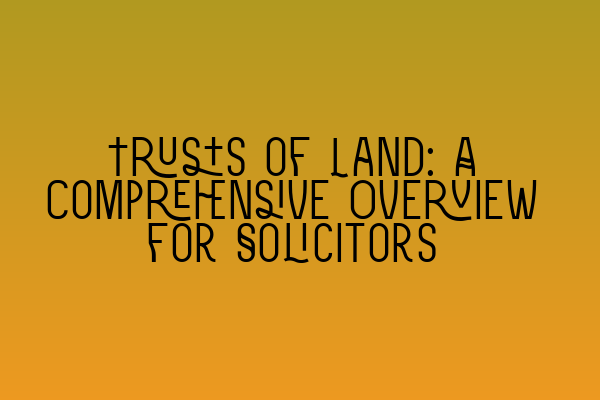Trusts of Land: A Comprehensive Overview for Solicitors
Trusts of Land (ToL) are a vital aspect of property law that every solicitor should have a firm grasp on. Understanding the intricacies of ToL is essential to effectively advise clients and navigate complex property transactions. In this comprehensive overview, we will delve into the core concepts of ToL and explore key aspects that solicitors need to be familiar with.
Before we dive into the details, it’s worth mentioning that developing strong legal research skills is crucial for success as a solicitor. If you haven’t already, I highly recommend checking out our article on unlocking legal research skills for SQE success [link to article 48]. This will provide you with valuable insights and techniques to enhance your legal research abilities.
Now, let’s begin by exploring the fundamental principles of trusts. A trust is a legal arrangement where a person, known as the settlor, transfers assets to another person, known as the trustee, who holds the assets for the benefit of a third party, known as the beneficiary. Trusts can be created for various purposes, and in the context of land, ToL specifically deals with trusts that involve property.
One key concept in ToL is the distinction between legal and beneficial ownership. Legal ownership refers to the person who holds the title to the property, while beneficial ownership refers to the person who enjoys the benefits and rights associated with the property. In ToL, the legal owner is the trustee, while the beneficiaries hold beneficial ownership.
It is important to note that ToL can be created either expressly through a written trust deed or impliedly through the actions and intentions of the parties involved. Express trusts are created when the settlor explicitly states their intention to create a trust and outlines the terms and conditions. On the other hand, implied trusts are created when the circumstances surrounding a property transaction indicate the existence of a trust, even if it is not explicitly stated.
In ToL, the trustees have a range of powers and duties. They are responsible for managing the property, making decisions in the best interests of the beneficiaries, and maintaining accurate records. Trustees must act with utmost care and diligence, ensuring they do not breach their fiduciary duties. It is essential for solicitors to guide trustees in fulfilling their obligations and avoid any legal consequences.
One significant aspect of ToL is the ability to modify or terminate the trust. This can be done through various means, such as by agreement between the beneficiaries and trustees, by court order, or by operation of law. Solicitors should be well-versed in the procedures and requirements for modifying or terminating ToL, as this can have significant implications for the parties involved.
Now, let’s talk about co-ownership and ToL. Co-ownership occurs when two or more individuals jointly own a property. It is vital for solicitors to understand the distinction between joint tenancy and tenancy in common. In a joint tenancy, the co-owners hold an equal share in the property, and upon the death of one co-owner, their share automatically passes to the surviving co-owners. In contrast, in a tenancy in common, each co-owner holds a specific share in the property, which can be transferred or inherited separately.
It’s important for solicitors to guide clients in choosing the appropriate form of co-ownership and to advise them on the implications of each option. This ensures that their interests are protected and any potential disputes or issues are minimized.
In addition to our comprehensive overview of ToL, we have a range of articles that cover essential topics related to the SQE exam and property law. Understanding functioning legal knowledge (FLK) is crucial for success as an SQE candidate, so I highly recommend reading our article on FLK core concepts for SQE candidates [link to article 53]. This will provide you with a solid foundation of knowledge and help you prepare effectively for the exam.
Building a strong foundation of legal knowledge is also essential, and having the right textbooks can significantly aid your exam preparation. Check out our article on essential SQE textbooks [link to article 44] for recommendations on texts that will help you navigate through the vast amount of information required for the exam.
To ensure a smooth journey through the SQE stages, it is crucial to have a roadmap to success. Our article on unraveling the SQE stages [link to article 43] provides you with a clear understanding of the stages involved in the exam and how to navigate them effectively.
Lastly, it’s essential to have convenient and accessible test centers for the SQE exam. Our article on test centers for SQE [link to article 41] provides insights into the available locations, enabling you to choose the most convenient option for your exam.
In conclusion, trusts of land are a significant aspect of property law that solicitors must be well-versed in. From understanding the principles of trusts to navigating co-ownership and the modification or termination of trusts, solicitors play a crucial role in advising clients on trusts of land matters. By developing your legal research skills, building a strong foundation of legal knowledge, and understanding the SQE exam stages, you will be well-equipped to excel in your career as a property law solicitor.
Remember, SQE Property Law & Land Law is here to support you in your journey towards success.
